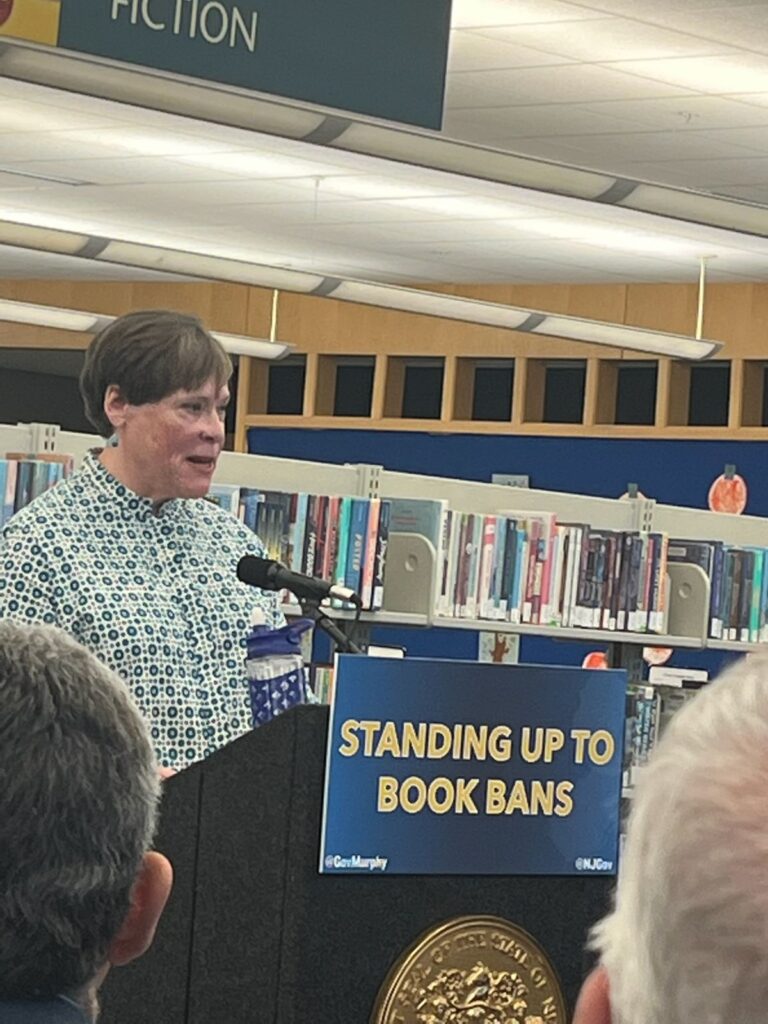Hickson Reads Far More than Just the Room at Bill Signing

PRINCETON - Phil Murphy was the guy with the pen, but the star of the show was Martha Hickson.
The now-retired librarian in the North Hunterdon regional district, Hickson was the lead-off speaker Monday morning as the governor signed the Freedom to Read bill - appropriately in the childrens' section of the local library.
It was Hickson's traumatic experience dating back to the fall of 2021 that sparked the bill's creation.
As Hickson related to about 50 or so people, it was in September of that year that she was first called a "pedophile" and a "groomer" at a school board meeting. All that because she refused to remove five books from the library that critics deemed pornographic or unfit for students. The books in question were related to LGBT rights.
Things got worse.
Hickson said that as condemnation of her continued online, her car was vandalized and she received vile email messages and other warnings, including a book about the "fires of Hell," which she held up.
And then came another board meeting when there was the proverbial light at the end of the tunnel.
That's when state Sen. Andrerw Zwicker asked her what the state could do to help.
The answer was the Freedom to Read Bill. The legislation went through some changes, but was adopted earlier this year by both houses.
The bill directs libraries to offer a wide variety of books and not to exclude material simply because it is controversial or may offend someone.
A key provision gives librarians immunity from civil or criminal liability, assuming they undertake their duties in "good faith."
Zwicker, whose 16th District includes Princeton, called the bill a "big step forward for intellectual freedom."
Murphy expressed similar thoughts and hailed Hickson as a "champion of the free exchange of knowledge and ideas."
This was basically a Democratic initiative, but there was some Republican support. The governor singled out Republican Sen. Jon Bramnick, who was a co-sponsor.
Bramnick is running for governor and that stance has drawn criticism from some of his rivals.
State Sen. Teresa Ruiz of Essex County, another co-sponsor, addressed criticism that some youngsters might pick up a library book their parents would not want them to read.
"Look in their book bag," Ruiz said, suggesting that parents should monitor their child's reading habits.
But, as the bill implies, parents do not have the right to judge the reading habits of others.
Opponents fought the bill in Trenton and the governor said he saw protesters outside the library when he arrived. (For the record, I did not see any protesters when I arrived and left).
Murphy said the bill signing made this a good day,
But all is not peaches and cream.
With Jan. 20 becoming closer every day, Murphy noted that it matters more than ever what state you live in.
"Not every state is doing what we are doing," he said.
That allowed Murphy to reiterate what he said the day after the election. New Jersey will do all it can to support reproductive rights, its gun laws and immigrants in the face of any threats from the Trump Administration.






The Freedom to Read Law only became a necessity after a few individuals in different area of not only New Jersey, but the entire country, decided that trampling all over the First Amendment was their duty. Rather, it is all of our responsibilities to protect these freedoms. Much as you go into a supermarket and choose not to purchase certain items, this is true of libraries: you have the right to choose, which includes not borrowing a book. Further, if you are a parent, isn't it your responsibility to review your child's reading choices, if you are concerned about what they are reading?
"The Freedom to Read" law is another make-believe, made up law that the Democrat-Communists will try and make you believe is constitutional. Nowhere in the N.J. Constitution or the U.S. Constitution is there an amendment called "Freedom to Read". It is not a constitutional right. It's another attempt at a law to divide New Jerseyans and force a made up law down New Jersey residents' throats because some special interest group(s), e.g., LGBTQ+MICKEY MOUSE groups, and other suspect groups want special privileges.